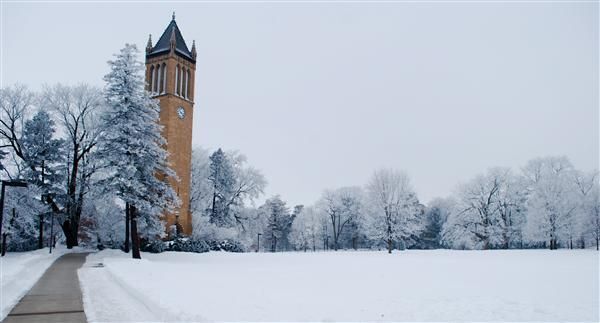Students share thoughts on winter session courses
January 25, 2021
Iowa State students had the opportunity to take classes during the extended Winter Break. Classes were held virtually from Dec. 14, 2020, to Jan. 21, 2021, as accelerated courses. Students were only allowed to take four credits during this time.
Beate Schmittmann serves as the dean of the College of Liberal Arts and Sciences and executive planning committee chair for the winter session. In a previous interview, Schmittmann said course selection for the winter session was more of an experiment, and the university will see how this session goes before making winter classes a permanent addition to the Iowa State calendar in the future.
“[Success] means that we will have good enrollment in the courses [and] students and faculty generally report that they are satisfied,” Schmittmann said. “We want to make sure students stay with the courses they enroll in and complete the session successfully. If all of these areas are successful, we will definitely consider having another winter session next year.”
Mary Stivers, a sophomore in management, said she took an ethical leadership course with three credits during the winter session.
“Since the break was two months long, I wanted to keep busy and keep a schedule,” Stivers said. “I took the class to stay active. It also was a requirement I wanted to get done.”
Stivers said she liked that she could devote more time to one class, instead of splitting her time between multiple classes. She never had to meet with her class synchronously, which she said is one thing she would change about winter session.
“I would probably put one meeting a week, just to keep people on task,” she said. “I would also be interested in taking more credits during the winter classes, pushing that four-credit limit to maybe six credits.”
Stivers said she checked Canvas every day to make sure she wasn’t missing any assignments, but ultimately spent two hours a week working on her classwork.
Eli Lindsey, freshman in landscape architecture, retook a calculus class over Winter Break to boost his grade in the class further.
“I like the way [my professor] set up the class,” Lindsey said. “We basically did one section a day, which seems like a lot but really wasn’t that bad.”
He said he ended up spending one to two hours on assignments each day for the class, without synchronous meetings. If he could change anything about the course, he said he wanted more office hours with his professor.
“[My professor] had office hours once a week, but I always had to work during them,” he said.
The most challenging part of winter session classes for Lindsey was staying motivated.
“Technically, I was on break so it was hard to go and do schoolwork, and I was already working a job for eight hours a day,” he said. “You have all these distractions because you’re at home and the last thing you want to be doing is schoolwork, but you have to do your best.”
Sophie Adams, freshman in global resource systems, took an agriculture class and a liberal arts and sciences class for four credits over winter session.
Adams said she was able to take the courses for free with her father’s military status through the GI Bill. Her agriculture class was synchronous, so she could ask her professors questions in real time, but she said she thought winter classes should’ve started sooner.
“We had a two-month break, so we could’ve spread [classes] out more,” she said. “When it did start in mid-December, it wasn’t an overload of coursework. It felt the same as during the semester, but instead of taking 17 credits I was taking four credits with the same course load.”
Adams said she felt that teachers were very understanding and implemented soft deadlines for the courses, meaning a student could turn something in up to a week later than it was due.
“The professors were really good about their hours and emailing back,” she said. “Even though it was hard to learn remotely, professors were still very much present and helping you.
“I think having a winter session for students would definitely be good because students were willing to pay for it. It would be helpful for upperclassmen who are behind on their four-year plan and can get a couple of extra credits in.”







